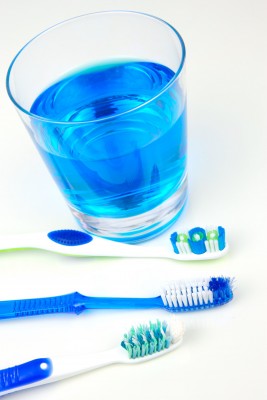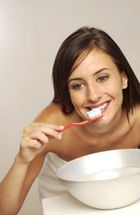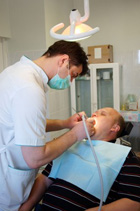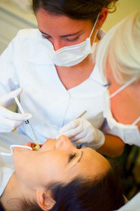 On your shopping list when you visit the super market or the corner store will probably be tooth paste containing fluoride, a new tooth brush if your current one is not fit for purpose and some dental floss. But many people wonder about whether to pick up some mouth wash too. The adverts tell us that mouth wash kills bacteria and freshens breath but is it worth our while to use it?
On your shopping list when you visit the super market or the corner store will probably be tooth paste containing fluoride, a new tooth brush if your current one is not fit for purpose and some dental floss. But many people wonder about whether to pick up some mouth wash too. The adverts tell us that mouth wash kills bacteria and freshens breath but is it worth our while to use it?
Mouth wash does indeed kill bacteria in the mouth, indeed some boast of being able to kill ninety nine point nine per cent of all bacteria. But that is part of the problem. Not all bacteria in the mouth is bad for you and mouth wash is unable to discriminate; it kills the good bacteria and the bad bacteria.
Mouth wash is able to freshen your breath by killing the bad bacteria and freshening breath by implanting a flavour in the mouth, mint or cloves for example. But this can be a further problem. Mouth wash actually makes the mouth rather dry and this is the ideal condition in which bad breath bacteria can thrive. When the teeth and tongue are dry, it is far easier for bad bacteria to stick to teeth. In short, you could be making your mouth into the ideal playground for bad breath bacteria by using mouth wash. It’s no wonder then that some people like to chew gum after using mouth wash because it stimulates saliva production and makes the mouth more moist.
Sometimes your Leeds dentist will advise you to actually use mouth wash, especially if you are suffering from gum disease. There are specially formulated mouth washes available for this purpose and you should always follow your dentist’s advice but they will probably tell you not to use it too often.





 Taking care of your teeth might seem like a daunting business, especially if you have suffered from poor oral hygiene in the past. But don’t be intimidated by it; following a simple set of instructions so that they become habits will help you with maintaining excellent oral hygiene for the rest of your life. Read on to find out more!
Taking care of your teeth might seem like a daunting business, especially if you have suffered from poor oral hygiene in the past. But don’t be intimidated by it; following a simple set of instructions so that they become habits will help you with maintaining excellent oral hygiene for the rest of your life. Read on to find out more! Gum disease is all too common in the United Kingdom and dentists are anxious to something about it, with your help. The unfortunate and painful fact is that gum disease actually leads to more cases of tooth loss than the decay of teeth through cavities. The reasons for the prevalence of gum disease can be put down to many people not recognising the signs of it and also people neglecting to go to the dentist as often as they should.
Gum disease is all too common in the United Kingdom and dentists are anxious to something about it, with your help. The unfortunate and painful fact is that gum disease actually leads to more cases of tooth loss than the decay of teeth through cavities. The reasons for the prevalence of gum disease can be put down to many people not recognising the signs of it and also people neglecting to go to the dentist as often as they should. Your teeth are complex things and not just solid blocks. In fact they contain a hollow inside each of them which is filled with a mixture of substances known as pulp. Pulp comprises blood vessels, nerves and an assortment of other cells which are vital to the health of your tooth as a whole. Tooth decay and accidents affecting your mouth can cause the pulp to become inflamed and you will experience pulpitis. Thankfully it is usually reversible and your dentist will be able to restore the tooth to good health and functionality.
Your teeth are complex things and not just solid blocks. In fact they contain a hollow inside each of them which is filled with a mixture of substances known as pulp. Pulp comprises blood vessels, nerves and an assortment of other cells which are vital to the health of your tooth as a whole. Tooth decay and accidents affecting your mouth can cause the pulp to become inflamed and you will experience pulpitis. Thankfully it is usually reversible and your dentist will be able to restore the tooth to good health and functionality. Taking care of your teeth properly needs to form an integral part of your every day routine in the same way that you have a shower, eat your meals and go to bed at night. If you don’t take care of your teeth properly then you could lose them and they are the only natural set that you have. Don’t put yourself at the mercy of dental decay and gum disease, follow the simple suggestions set out below and you should have nothing to worry about when it comes to the good health of your mouth.
Taking care of your teeth properly needs to form an integral part of your every day routine in the same way that you have a shower, eat your meals and go to bed at night. If you don’t take care of your teeth properly then you could lose them and they are the only natural set that you have. Don’t put yourself at the mercy of dental decay and gum disease, follow the simple suggestions set out below and you should have nothing to worry about when it comes to the good health of your mouth. Imagine if you could have your missing teeth replaced by teeth that are so realistic looking and so securely housed in your mouth that not only will your closest intimates not notice that they are not natural, but you will forget that you ever lost any teeth. It might have seemed like a pipe dream a while ago but thanks to incredible advances in technology that have affected the way that dentists work, it is possible for you to have this.
Imagine if you could have your missing teeth replaced by teeth that are so realistic looking and so securely housed in your mouth that not only will your closest intimates not notice that they are not natural, but you will forget that you ever lost any teeth. It might have seemed like a pipe dream a while ago but thanks to incredible advances in technology that have affected the way that dentists work, it is possible for you to have this. There are many good reasons to go and see your dentist every six months. If you have been recently then you will know about how they administer scaling and polishing to get rid of troublesome tartar and that they look out for signs of dental decay, oral cancer and sleep apnea. But your dentist is also keeping a close eye on the state of your gums. And thank goodness they are because gum disease actually causes more cases of tooth loss than decaying teeth themselves.
There are many good reasons to go and see your dentist every six months. If you have been recently then you will know about how they administer scaling and polishing to get rid of troublesome tartar and that they look out for signs of dental decay, oral cancer and sleep apnea. But your dentist is also keeping a close eye on the state of your gums. And thank goodness they are because gum disease actually causes more cases of tooth loss than decaying teeth themselves. Bringing up children can be fraught with difficulties and you will probably spend much of your time worrying about whether you are doing the right things so that your offspring are growing to be healthy and happy. Nobody wants to fuss over their children too much and leave them without a sense of self reliance but you should be taking steps to ensure that they have healthy teeth and gums and do not have to go through the pain of an oral condition.
Bringing up children can be fraught with difficulties and you will probably spend much of your time worrying about whether you are doing the right things so that your offspring are growing to be healthy and happy. Nobody wants to fuss over their children too much and leave them without a sense of self reliance but you should be taking steps to ensure that they have healthy teeth and gums and do not have to go through the pain of an oral condition. As we get older our hair tends to go grey and sometimes we even start losing it. Skin can become more wrinkled and we might feel that we just don’t look as good as we did we were younger. But when it comes to the state of your teeth, there is no need to put up with the inevitable changes in colour that are likely to occur.
As we get older our hair tends to go grey and sometimes we even start losing it. Skin can become more wrinkled and we might feel that we just don’t look as good as we did we were younger. But when it comes to the state of your teeth, there is no need to put up with the inevitable changes in colour that are likely to occur. Going to the dentist for a visit every six months or so goes a long way to helping with keeping your teeth and gums healthy. Your mouth is a highly specialised collection of parts which work together to make your life easier. If any one part of it becomes diseased or loses functionality then it can threaten the smooth working of the whole thing. Your dentist is best placed to examine the whole of your mouth so that it stays healthy for you.
Going to the dentist for a visit every six months or so goes a long way to helping with keeping your teeth and gums healthy. Your mouth is a highly specialised collection of parts which work together to make your life easier. If any one part of it becomes diseased or loses functionality then it can threaten the smooth working of the whole thing. Your dentist is best placed to examine the whole of your mouth so that it stays healthy for you.

